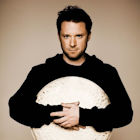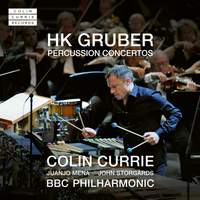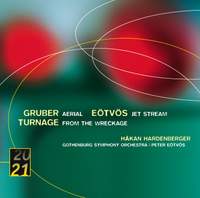Interview,
Colin Currie on HK Gruber
 Of the many works which the Scottish percussionist Colin Currie has premiered over the course of his career, HK Gruber's concerto into the open... (first performed at the BBC Proms in 2015) stands out for its sheer scale, exuberance and invention, with the composer himself describing it as a celebration of 'percussive noise-making in all its extrovert forms'. The first recording of the piece was issued on Currie's own label last month alongside Gruber's earlier concerto Rough Music, prompting BBC Music Magazine to declare that 'Currie’s performance matches the composer’s charisma'.
Of the many works which the Scottish percussionist Colin Currie has premiered over the course of his career, HK Gruber's concerto into the open... (first performed at the BBC Proms in 2015) stands out for its sheer scale, exuberance and invention, with the composer himself describing it as a celebration of 'percussive noise-making in all its extrovert forms'. The first recording of the piece was issued on Currie's own label last month alongside Gruber's earlier concerto Rough Music, prompting BBC Music Magazine to declare that 'Currie’s performance matches the composer’s charisma'.
Colin and I spoke over Zoom last month about his colourful relationship with Gruber and his music, the welcome explosion of new works for percussion and orchestra in the twenty-first century, the various new commissions he's got in the pipeline, and the challenges of practising in lockdown...
How did your friendship with Gruber begin?
He just grabbed my attention when I heard Aerial, the trumpet concerto which was premiered in 1999, right after I left music college. The soloist Håkan Hardenberger was somebody who was on my radar, and he’s since also become an extremely close colleague. I remember going to the world premiere of that piece and thinking it was outrageous – it was a robust musical challenge, so different and exciting and full of ideas.
It turned out that Nali [Gruber] and I had the same agent in common at Intermusica, so I found a way to get in touch with him; I’d already been told about his percussion concerto Rough Music, which was an older work from 1983, and we eventually performed it together at the Gewandhaus in Leipzig in 2001. It was just a great experience – we’d go out for enormous dinners and end up talking all night long about music and culture (and probably a lot of nonsense as well), and we struck up a really high-octane friendship.
What’s the story behind the nickname ‘Nali’?!
Nali was in the Vienna Boys’ Choir, and when they were on tour staying in a dormitory he had some sort of strange nightmare and started making this peculiar noise that sounded like ‘nah-lee, nah-lee!’ The next day his fellow choristers were taking the mick out of him, and it just kind of stuck!
When Rough Music was composed in the 1980s, there were not many percussion concertos available that Gruber might have looked to for inspiration. Do you think that this situation has improved over the intervening decades?
Honestly, it’s unrecognisable since then. Works like Rough Music have a special significance for us percussionists, for sure, but it’s also a standout piece in the broader repertoire: it’s a brilliant concerto, and such an enormous amount of things happen in those twenty-five minutes. Over the course of its three movements you feel like you’ve gone round the musical planet twice and backwards, travelled to the core of it and out into the atmosphere as well! I would say that especially since the year 2000 the percussion concerto repertoire has expanded beyond our wildest dreams: the great composers of our day have added to that genre of pieces, and it’s an incredible haul. There are so many wonderful new pieces that I couldn’t even list them all – and they encompass so many different styles and different walks of life.
For Rough Music Nali did have a look to see what was out there, but he only actually cited two works as antecedents for him: one is Darius Milhaud’s piece from the 1930s, which is really the first percussion concerto, and the other is by Jolivet, from the 1970s. So it was an incredible leap forward, and I love the fact that he was so ambitious with the musical language and didn’t get cautious with the writing. And I think that the collaboration which he had with the original soloist, Gerald Fromme, played a big part: it was a partnership of sorts, and I’m sure Nali had a lot of workshops and spent a lot of time trying things out with him.
Is there a connection between Rough Music and the tumultuous traditional community practice of the same name?
Yes and no. I think he was looking for different refractions of one idea: the title of the concerto is refracted in the titles of movements 1 and 2 - ‘Toberac’ is a Basque word for ‘rough music’, and ‘Shivaree’, the second movement, is another term for the same thing. It’s all about different ways of looking at this idea of a kind of clangorous assembly of sound, rather than about the shaky morality of rough music being meted out in societies a very long time ago. It’s no comment on that, and I think I personally am quite keen to distance myself from such a thing. The idea of a rowdy crowd making ‘rough music’ just sparked his imagination: it’s not more than that, but I think it’s an interesting series of titles.
Some scholars have identified Gruber as a member, or even the leader, of a 'Third Viennese School', centred on the Klangforum Wien contemporary music ensemble. Do you think there’s a unified School in this sense, with a shared general view of music like that of the Second?
I’ve never asked him about that specifically, but I think it’s accurate. Nali must if anything be the Young Turk in that threesome: Hanns Eisler is no longer with us, Kurt Schwertsik turned 85 last year, and Nali just turned 78. They all absorbed bits and pieces from the Second Viennese School (Berg in particular), but also pushed back against it in some ways - especially Schwertsik, who is very much not a fan of the music of Schoenberg. But they’ve all gone through that Expressionist mindset and thought about it in their music and orchestration, which manifests in a particular kind of brilliance and also a certain academic dignity: Nali, for example, is always talking about tone-rows in his music, which of course started with Schoenberg. I do like the idea of these guys constituting a Third Viennese School - they’re all a bit wild and wired and eccentric!
The notes accompanying this recording refer to a connection between Gruber and Kurt Weill, and there is of course that fragmentary quotation from Alabama Song in into the open…. How much influence do you think Weill’s style had on Gruber’s?
Kurt Weill is really the overarching influence for Nali. You can hear it in the melodic lines and some of the orchestration, and also the fondness for the music-hall songs and style of singing - that kind of smoky, seedy, noir thing that we associate with Berlin in the 1920s and 30s. I think Nali is one of those people who almost belongs to a different era: he would have fitted right into pre-War culture in Germany and Austria, and he’s made it a real business of his to be a Kurt Weill scholar – he knows this music inside-out, and he can read and understand all the codes and undercurrents. Weill is an underrated composer, no doubt about it, and Nali is absolutely attuned to his genius: there’s a depth and profundity underpinning all that cabaret-style stuff, and Nali really digs that.
Is Nali still writing?
He is indeed – he’s currently working on an orchestral piece for Andris Nelsons...
You mentioned Gerald Fromme’s hands-on involvement with Rough Music back in the 1980s – did you have a similar relationship with Nail whilst he was working on into the open…?
Nali keeps himself to himself when he’s writing, although into the open… was interesting because I received it as a completed work and it needed many changes. He kind of knew that he’d gone down the wrong alley-way with the piece originally, with instruments from here to Timbuktu, and it did need reining in a bit: I scaled back and reorchestrated some of the percussion writing, but he still got the massive palate of sounds he needed. Because he knew and trusted me he essentially gave me carte blanche to deliver the final edition of the percussion-part, and that’s what was eventually published – Nali actually calls it ‘the Colin Currie Edition’! It’s a fiendishly virtuosic piece, and even now it’s still barely playable but at least you can fit it on the platform!
Presumably, given the scale of these pieces, the recordings were made pre-lockdown?
They’re actually from live concerts, which is nice: recording in the studio is one thing and I’ve done it many times, but with a live gig you can really feel that crackle of energy. With the premiere of into the open… in 2015 I knew that I had two masterpieces under my hands, and I really wanted to have them together on disc because I felt that Nali was a little bit under-represented as a composer. The orchestra in both cases had been the BBC Philharmonic, and when we looked at the archive recordings they were pretty clean. Obviously you can’t do any edits, but you can work on balances a little bit and polish the sound; I brought in my producer Marion Schwebel to look at that side of things, and it came together really quickly.
Have you had any opportunities to perform at all over the past year?
It’s been very, very limited – I had a few gigs in the autumn in Eastern Europe and the North, but other than that I’m in the middle of a five-month period of unemployment. It’s very tough but everyone has to play their part, and if me being grounded means schools can be open I’ll take that on the chin…
I was supposed to have done two premieres by now, but they’ve both been postponed: Bruno Mantovani has written me an outrageous percussion concerto called Allegro barbaro, which was scheduled for Paris last year but will now premiere in Austria in June, all being well. It’s a very big symphonic work, cacophonous and brilliant, with no tuned percussion instruments. The other one was a chamber concerto by the British composer Luke Bedford, which is now going to happen next season. And a wonderful French-Canadian composer called Nicole Lizée is writing me a piece too – that’s been postponed a little more heavily, but it’s definitely going to happen!
And how much have you been able to practise during lockdown? It must pose particular challenges for a percussionist…
Fortunately I’ve got a good set-up at home in Glasgow: I live in a detached house with a big music-room and I moved here in November 2019, so that was serendipitous… A lockdown in London would’ve been much more awkward, with everyone staying at home and living on top of each other - I made it out just in time!
Colin Currie (percussion), BBC Philharmonic, Juanjo Mena
Available Formats: CD, MP3, FLAC, Hi-Res FLAC
Håkan Hardenberger (trumpet), Gothenburg Symphony Orchestra, Peter Eötvös
Available Formats: MP3, FLAC




